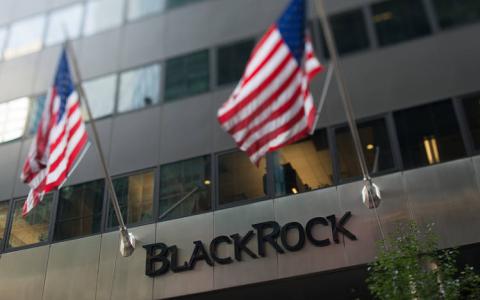
(Bloomberg) Larry Fink, boss of $7 trillion asset manager BlackRock Inc., has long prided himself on being a bit of a populist whisperer. He frequently lectures the world’s CEOs on the need for a “social purpose” to go with profits, warning them that an increasingly angry public expects firms to meet higher social and ethical standards. Trust in institutions is down, he says; social-media pressure is up.
Yet of all the knock-on effects of Fink’s crusade to make passive low-cost investing more activist, the one he surely didn’t expect was public ire at BlackRock itself. A firm that was supposed to be the opposite of the Goldman Sachs Group Inc.“vampire squid” — no banking relationships, no conflicts of interest, no rapacious fees — is being targeted by protesters on a range of issues, from pensions to climate change. Instead of being held up as a tool of people power, offering dirt-cheap investments, it’s become a punching bag.
The sight of protesters storming BlackRock’s headquarters in Paris this week in anger at French President Emmanuel Macron’s flagship pension reform is the latest example of how messy BlackRock-bashing has become. Brandishing flares and singing slogans, the group labeled BlackRock a “pension fund” (which it isn’t) and said that Macron’s reforms were designed for its benefit (which they weren’t). As a conspiracy theory, it's unimpressive: Macron’s bid to level the playing field by replacing 42 different systems with a points-based one doesn’t actually change the way pensions are funded in France by those in work. But as a piece of agit-prop, it’s clever: The catchy name of a U.S. multinational travels far better than dry actuarial tables. For a strike-weary populace, it sticks in the mind.
Yet it’s also a sign that BlackRock’s approach to preaching the gospel of passive investment and millennial ethics isn’t quite working. Populist politicians like France’s Marine Le Pen and social-media campaigns have seized on BlackRock not just because it’s big and foreign, but because the company’s specific views on retirement and pension planning are entirely public and easy to find. Unsurprisingly, they call for more investment. In 2018, BlackRock’s French head, Jean-François Cirelli, said the general approach of the Macron administration was a good one in that it encouraged people to think about their pension and start saving. That he was recently put on the honor list for France's highest distinction, the Legion of Honor, only served to fuel the outrage.
The very same “anxiety and fear” about retirement that Fink has warned CEOs about is now being used against his own firm and its core product, at least in France.
Elsewhere in Europe, pesky millennials have other bones to pick with BlackRock. Last year, Extinction Rebellion’s climate activists poured ash in front of BlackRock’s London headquarters to protest its holdings in fossil fuels. As a target, the firm might seem slightly off-center given the way passive investing works: If the job of a tracker fund is to track an index, a $200 billion BlackRock fund tracking the S&P 500 isn’t going to arbitrarily drop Exxon Mobil Corp. on climate concerns. And the protesters failed to acknowledge Fink’s own governance message to other CEOs, for whom “environmental risks” are flagged as top priorities for 2019. While BlackRock wants to hold management’s feet to the fire, it’s finding out that in today’s world, some people would rather it change its own core investment practices as well.
These may be pockets of ire for now, but they point to increasing pressure on BlackRock’s “license to operate” from its stakeholders (another term used by Fink). Over the past decade, criticism of BlackRock has largely come from other finance types preoccupied with technical issues like systemic risk. Its defenders pointed to the index-fund revolution as a tool of empowerment for consumers, which, to be fair, it has been. But BlackRock begins the new decade as a corporate overlord — one of the Big Three — with the voting power to change the world, even if there’s no robber-baron motivation behind it. Maybe the next letter Fink writes on how to deal with growing social and governance pressures should be addressed to himself.



